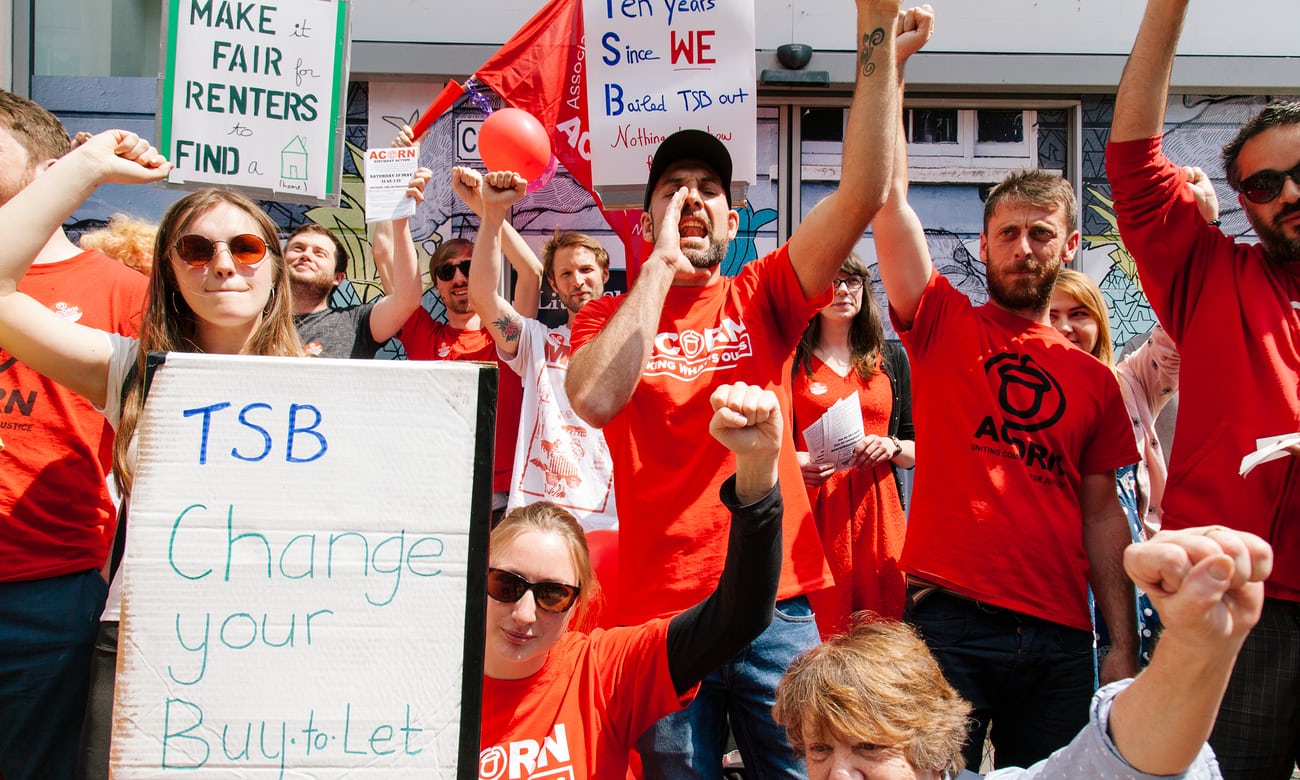Your cart is currently empty!
Category: Bristol
-
ACORN Christmas Carols
Report for BCfm on ACORN Bristol’s carol procession to build local resistance to development that includes zero affordable or social houses. (BCfmradio.com)
-

Do you live in shoddy housing that costs a fortune? Time to join the renters’ union
Copy of Article from the Guardian available here.
 Photograph: James Arthur Allen for the Guardian
Photograph: James Arthur Allen for the Guardian It is a warm, sunny Saturday lunchtime in the centre of Bristol. Somewhere else in the country a royal wedding is about to take place, but here a group of two dozen demonstrators in red T-shirts are heading into TSB, armed with a list of demands. “Private renting isn’t fun,” they sing, “when you’re paying for a slum. Stop it happening to you, better join the Acorn crew. Housing is a human right, won’t give up without a fight”.
The organisation behind the good-natured protest is a trade union for renters called Acorn, first set up in Bristol four years ago. Since then, as frustration and anger about the housing market – and particularly the conditions for private renters – has grown, the group has gradually spread around the country, with branches springing up in cities including Brighton and Sheffield. Anny Cullum, an activist and NHS administrator, says that until she got involved in Acorn, “there didn’t seem to be anything similar in the community. The way to ensure you have your right to a proper, decent and dignified way of living is for ordinary people to band together.”
Acorn frequently works through direct action: members organise protests in their spare time, taking photos on their mobile phones and sharing them on social media with the aim of embarrassing their targets into agreeing to their demands – forcing landlords to repair mouldy properties or stopping evictions they consider unjust. They have targeted TSB because the bank has clauses in its buy-to-let mortgages that forbid landlords from renting to people on benefits, to asylum seekers, and in some circumstances to students. But on the night before the protest, having notified the bank of their intention to demonstrate, TSB relents; an email is sent to Acorn indicating the bank will change its terms and conditions so that buy-to-let mortgage holders can rent to people on benefits.
“This is a massive win,” Cullum says, using a megaphone to address the assembled protesters. “If we weren’t here today, we wouldn’t be finding out about this, this wouldn’t be happening.” (Although the group is quick to argue that the other prohibitions ought to change too.) For its part, TSB confirms the policy change in an email; the bank says it has been reviewing this “for some time”, but the timing of its concession does not seem coincidental.
In April, a group of Acorn protesters in Bristol prevented a court-appointed bailiff from evicting Sally Andrews and her three children from a property owned by Ernest Arathoon, a former director of Bristol City. Andrews complained about the property’s disrepair after moving in a year ago – there were problems with the gas and damp. Arathoon said she was behind on her rent, and the property had only fallen into disrepair after she moved in. Acorn argued that the eviction was illegal anyway, because the tenant had not received the documents she should have done when she moved in, including gas safety and energy performance certificates. The landlord said Acorn had got its facts wrong.
“A lot of us showed up – about 30 of us,” says Ajmal Miah, an Acorn activist and student at the University of the West of England. “There was a community of people standing up for this tenant.”
Acorn wasn’t initially set up to focus on housing issues. Nick Ballard, one of the group’s founders, was trained as an organiser as part of David Cameron’s Big Society initiative. “We wanted to start a union in the community,” he says, and when he and other founders set up a public meeting to establish what Acorn should focus on, “housing and tenants’ rights were clearly the number one issues”. Bristol council’s own research, published in 2017, shows that private rented housing is becoming more and more common, accounting for 29% of all housing in the city, up from 24% in 2011 and 12% in 2001. At the same time, very little council housing is being built and there is a council waiting list of 11,000.
There is persistent frustration among Acorn members about private landlords who supply poor quality housing; Ballard recalls an early battle on behalf of a woman who had been living with “extreme levels of damp, fist-sized mushrooms growing on the walls of her bedroom”. Acorn members picketed a letting agency and the landlord’s business. Ultimately, the campaign apparently forced the landlord to pay for thousands of pounds worth of damp proofing at the woman’s house.
In recent years, rents in Bristol have been soaring, fuelled in part by a buoyant local economy, and also by Londoners, priced out of the capital, moving west. Louie Herbert, an Acorn organiser, says that in the five and a half years he has lived in Bristol, rooms that cost around £250 a month, in the Easton area, are now going for £400-500. This inner city neighbourhood was once multicultural and working class, but Herbert says he has had to move out: “I can’t afford to live in that area any more.”
Median Rents have gone up by 43% in the city since 2011, according to Valuation Office data as analysed by the BBC, and bidding wars for rental properties are not unusual. “A shared house that is put on for, say, £750 a month can easily end up going for £800,” says Cullum. Some locals are moving on to nearby towns such as Chippenham, where they can afford a property. Few believe they will ever be able to buy a property without help from their parents. Bristol property specialists JLL says a typical two bedroom apartment costs £280,000, having risen £20,000 during 2017 alone.
Students in the city have their own set of related concerns. Bristol Cut the Rent is a sister group to Acorn, and its members are frustrated by the price and quality of housing in a city with two expanding universities, Bristol and the University of the West of England. Bristol University student numbers were 17,100 in 2004-5; in 2017-18 they were 25,024. Nic Hamer, a second year who studies English, says: “I struggled to pay my rent in my first year and it was £107 per week – pretty much the cheapest you could pay”.
Hamer says students who can afford it are pushed to live in “big towers in the city centre run by companies like Unite” (which provides a significant proportion of the UK’s student accommodation). The cheapest rooms available are £150 a week, and rents can rise by 4–5% a year. Only the wealthiest students can afford to live in these rooms, which Hamer says is “gentrification in its purest form”. What frustrates her in particular is a belief that universities are incentivised to take on ever more students paying £9,000 a year in tuition fees, while ignoring the wider impact on the local renting economy. “They are using students to bankroll their finances,” she says. “Expansion of the university means they can take more units of nine grand in.”
After four years of successful campaigning, Acorn is now recognised by the city council as a voice for private renters. There is wide sympathy in the union for the local authority, particularly since the election of Labour’s Marvin Rees as mayor of Bristol in 2016. While there are repeated complaints that there is not enough social housing, there is also an acceptance that the council’s ability to build is constrained by central government. But that didn’t stop Acorn from opposing a clumsy attempt last year to end a council tax exemption for some of the city’s poorest households. “We were only asking councillors to stick to their manifesto,” says Aidan Cassidy, a former Bristol University student who now works for the local energy supplier, Bristol Energy.
There are two tiers of Acorn backers: there are around 500 paying members in Bristol. There is no specific fee, although people are asked to contribute one hour’s pay per month and the website suggests £8, £10 or £15 as possible sums. On top of that there are around 7,500 supporters: those who sign up for the mailing list and could be willing to turn up if needed. With some external support, it is enough to pay for a handful of organisers, and Acorn hopes to boost its presence around the country.
Ask Acorn members what frustrates them most about the housing market, and they tend to reply that the system seems increasingly rigged against them. There is too much damp, too much hassle, and economic interests are conspiring to ensure rents keep rising. Sasha Sadjady, a civil servant and one of Acorn’s founder members, says she got involved because renting was “incredibly precarious … places are snapped up in 24 hours. Landlords want to know all sorts of information about you. Then, when you are in the house, you only have six months’ security. Such is the precarity, you are never ever able to feel comfortable in what should be your own home.”
Sadjady says what annoys her the most about the housing market is a lack of understanding of the underlying economic forces at work – indicating what sort of longer term politics may emerge from a group like Acorn. “Sometimes it annoys me when you say it amounts to problems with certain landlords. There is always an antagonism there, because they are making a profit out of something that should be your right.”
